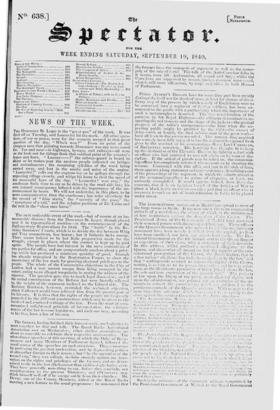Prince ALBERT ' S Hussars have tin' I is thne past been
greatly distinguished—if not for deeds of arms, It least for change of dress. Every step of the process by which a ;saly of Englishmen were to be converted into a regiment of Perish soldiers, has been an- nounced to the public with a particularity which the importance of such a metamorphosis deserved. The due consideration of the patterns by his Ro■s11 Ilighness—the ultimate determination re- specting the red trousers and the shape of the jackets—the gradual progre..s of the tailor's manipulations—the time when the ex- pecting public might be gratified by the sight—the causes of delay—anti, at length, the final achievement of the great work— have all been in due course recorded, '1 he renown thus acipired has scarcely been fully enj,iyed before the regiment has gained fresh glory by the emIduct of its commanditez—flietr, Lord CARDIGAN, of BacosNets. notoriety. Ills Lord-,:dp h is thought fit to keep up the distinction of the Eleventh llteesirs by lighting a duel with an officer who had ventured to cast reit ,chins on its want of dis- cipline. If the ordeal of pistols may be relied on, the command- ing-officer has completely rebutted the accusations by shooting the accuser. Connected with this affair, and just in the nick of time, there appears along statement and correspondence, describing some of the proceedings of the regiment, in which the minute attention of the commanding-officer to points of' etiquette, at least, are curiously exempkied. It would appear, indeed, from these do- commits, that it is an iasipieet breach c,f the Articles of War to
place a black boite on t!;i: and that an officer who is accessory to such en act o: ilin!.ardinittiou is liable to be placed under arrest.


























